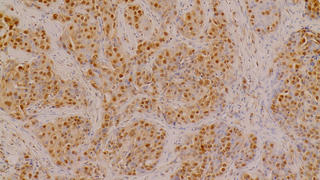Novel Breast Cancer Treatments

Triple-negative breast cancer (TNBC) is an aggressive form of cancer that disproportionately affects women of color. Prognosis for TNBC is the poorest among all types of breast cancers, and traditional treatment options carry risks to patients, including cancer recurrence, unintended eradication of healthy cells and adverse physical side effects.
Isabelle Mercier, PhD, chair and associate professor of pharmaceutical sciences, and Jean-Francois Jasmin, PhD, associate professor of pharmaceutical sciences, and associate provost for research and graduate administration and policy, have been studying breast cancers and the molecular mechanisms associated with them for more than a decade.
“Hands-on research strengthens their problem-solving, communication and leadership skills. It’s been proven time and time again that when you practice something hands-on, it helps you better understand concepts in the classroom.” - Jean-Francois Jasmin, PhD
The pair were awarded a three-year, $435,000 R15 grant from the National Institutes of Health’s (NIH) National Cancer Institute to study a protein called CAPER (RBM39) that will allow for a more targeted treatment option.
“We are working on biomarker discovery, in this case, identifying something inside the tumor that makes it grow quickly,” explains Mercier. “The biomarker we identified in TNBC is a protein called CAPER, which makes the cancer cells grow fast and aggressively. Our study proposes to remove the protein from within the tumor, study it in preclinical studies to see how the tumor responds over time and in combination with traditional therapies.”
Mercier and Jasmin first identified this protein in a less-aggressive type of cancer and are using this research grant to explore options for patients who are in dire need of effective targeted therapies. The grant will also give them the opportunity to train Saint Joseph’s students to work in the biomedical and pharmaceutical industries and potentially become scientists themselves.
“Students are crucial to the research mission of the University," says Jasmin. "It’s a two-way street, he adds. “Hands-on research strengthens their problem-solving, communication and leadership skills. It’s been proven time and time again that when you practice something hands-on, it helps you better understand concepts in the classroom.”
Over the next several years, Mercier and Jasmin aim to publish their results in high-impact journals with the goal of garnering additional funding to pursue more research and, ultimately, having a positive impact on patients’ lives.
“It’s about building reputation amongst your peers, attracting the best and brightest students and faculty to the institution, and expanding the reach of our research,” says Jasmin.
While it’s still early, their work with the CAPER protein could be used to treat other types of aggressive cancers, including brain, lung, pancreatic and ovarian cancers.
